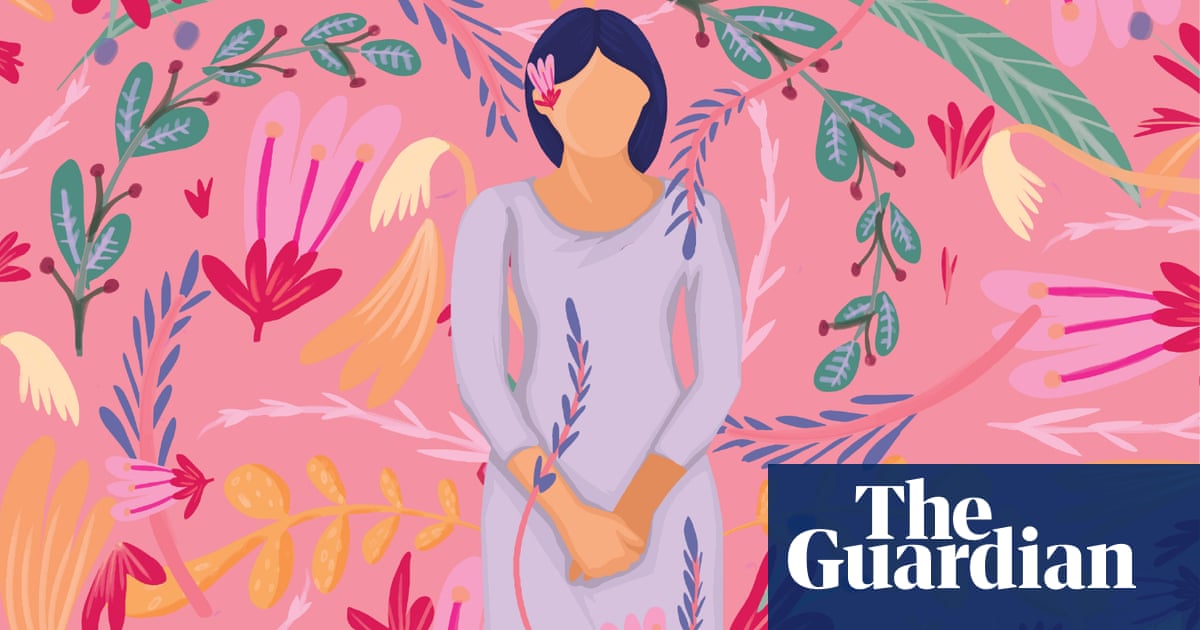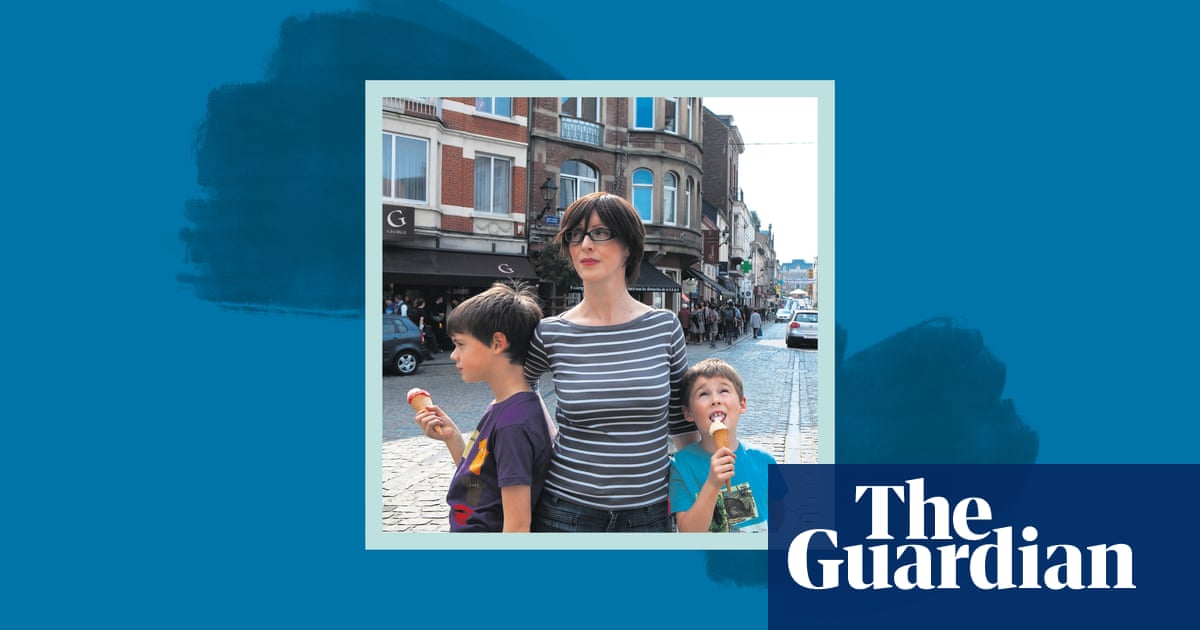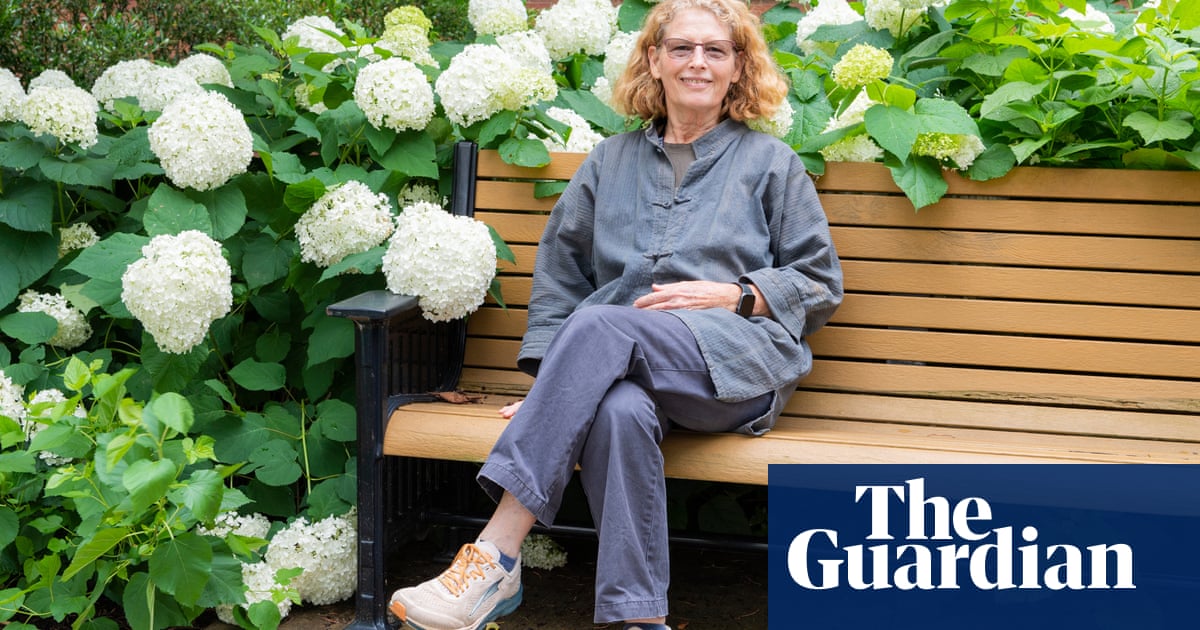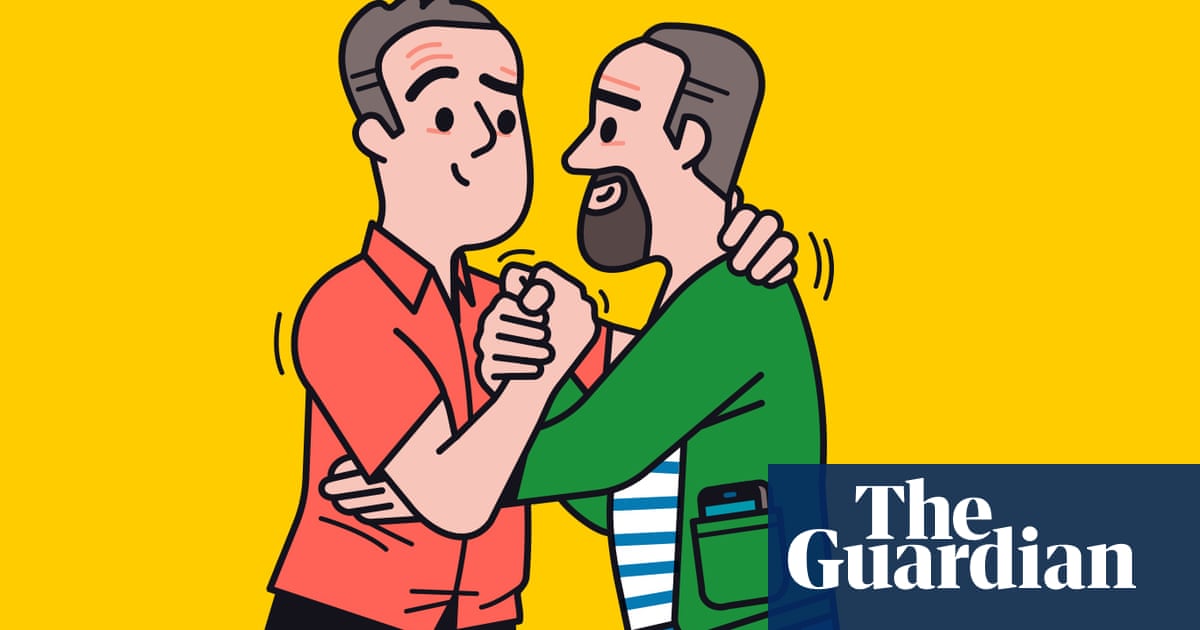
’d always wanted a brother,” says Declan Aumpu, the first time we meet. It’s April 2017, and I am 23 years old. Dec, 26, has arrived in the back of a friend’s van after a big night out. He is clearly nervous and has hardly slept. I’m anxious, too.
It’s strange that we have never met, especially since so many people know we are half-brothers, and I gulp back feelings of regret and shame. We don’t look much alike, beside our smiles, which curl up on the left-hand side of our mouths, but there is an instant connection; an immediate ease in each other’s company. As we embrace outside the Merlin’s Cave pub in Chalfont St Giles, south Buckinghamshire, it’s like being reunited with an old friend.
Later, in the pub, Dec tells me he was “forever envious of the bond that brothers seemed to share”, a feeling that only grew when, around the age of eight, he found out about me. He also explains that this is not our first meeting: more than two decades ago, we spontaneously played together with a boules set in a pub garden in nearby Chalfont St Peter, where our parents had grown up. Dec’s mum, Tracey, beckoned him away as soon she realised who I was. I had no idea of the identity of my fleeting playmate.
Dec drinks Stella; mine is a Guinness. The barman asks who I am, since Dec is a regular here, and Dec proudly says that I’m his brother. Noticing the height difference between us (I’m 6ft 4in and Dec is 5ft 8in), the barman raises an eyebrow and makes a joke about me being put into a grow bag at an early age.
I only learned of Dec’s existence relatively recently. When my parents first got together in 1991, my dad, Nick, then 27, told my mother, Mandy, 26, about a rumour going around that he had recently fathered a child; he said it wasn’t true, and my mum believed him. Soon afterwards, they moved from Chalfont St Peter to the more affordable town of Fenny Stratford, near Milton Keynes, where they had me and my younger brother, Rory. My mum heard nothing more about this rumour until many years later, when my uncle Andy referred to my dad’s “other son” during a conversation with my aunt Judy; she later told my mother.
Not wanting to disrupt Rory’s GCSEs, Mum spent the next six months silently seething, before confronting Dad. Clearly regretful and contrite, he eventually told us about our half-brother as we slowly chewed paneer at an Indian buffet in July 2016. He claimed he had been warned to stay away from his baby son after his friendship with Tracey broke down, and that he had duly done so. Tracey has since said she had wanted him to be either a constant presence in Dec’s life, or not present at all, and he had conceded that he was not ready to be a father. I was, and still am, bewildered: the dad I knew had never shied away from truth and responsibility.
Once the news had sunk in, I got in touch with Dec, a landscape gardener and builder, on Facebook, and we arranged to meet. We settled on the Merlin’s Cave, where he and my dad had met a handful of times since 2010, after my parents separated and my dad sent Tracey a Facebook friend request. Dec is keen to build a relationship with Dad, but neither of them are very good at texting each other back, never mind socialising or making time for enriching activities. Nor am I.
Dec tells me that, growing up in Chalfont St Peter, most people viewed his connection to the Busbys as a matter not to be spoken about. Tracey struggled for money, and they spent time in a homeless hostel before moving to the next village. “I still get called ‘the bastard Busby’ down the pub,” he says. “And at school, there were these girls who would viciously bully me for not having a dad.” This prompted Tracey to tell him that his dad had another family. Then, at the age of eight, Dec was diagnosed with diabetes, and took part in a genetic study; through this, he discovered our father’s name, and those of his half-siblings.
Dec and I both spent large parts of our childhoods alone; he is an only child, while Rory is six years younger than me, and we didn’t really connect until later in life. “If we’d been introduced when we were younger, it would have been a different experience,” Dec says now, three years after that first meeting. “But now you’re my little brother.” We may not see each other regularly, but we find comfort in keeping in touch to discuss our partners, work, family and the coronavirus. Just like brothers would.
How does it feel for other siblings united in later life? Almost one in five British families have been touched by estrangement, according to research by the charity Stand Alone, and a million children across the UK have no significant contact with their father. Reenee Singh, a psychotherapist and CEO of the Association of Family Therapy, is clear about the emotional burden associated with this: “It can be very difficult for half-siblings to grow up knowing they have a family somewhere they’re not in contact with,” she says. “If their existence was a secret, it can leave them feeling confused, vulnerable, unprotected and insecure.”
However, she warns against rushing into a meeting with an estranged sibling, pointing out that it is better to exchange photos, letters or messages on social media first. In my own case, she says: “You’re old enough to forge your own adult relationship and to bridge the gap between him and your father. The onus is on the siblings who have grown up with both their parents to reach out to their half-siblings.”
Reunions aren’t always straightforward, as the 2018 documentary Three Identical Strangers, about triplets separated at birth, tragically showed. Although the three brothers experienced a joyful reunion, followed by fame and success, they all struggled with mental health issues. One of the siblings, Eddy, took his own life in 1995. Meanwhile, plenty of people live their lives never knowing the whole story about their families or how many siblings they have.
My meeting with Dec had raised questions for us both, and made me want to speak to other people who had experienced something similar. How had they found their long-lost siblings? Had they been able to reconcile their different upbringings and move beyond pondering what might have been?
Sandy, who lives in Petworth, West Sussex, was brought up in Carlisle by his grandparents. His father, Jan, disappeared shortly after he was born, and remarried twice, fathering a number of other children, including Paul. “I wasn’t close with my mum,” Sandy says. “She was more like an aunt to me. As a kid, you feel a sense of abandonment. For about two and a half years from the age of 12, I was a carer for my grandmother when my grandfather was at work.”
When he was 18, Sandy visited Jan and his family in south Wales, to work out whether he should invite him to his wedding. It was during this visit that he discovered he had two younger siblings, Paul and Chantelle. But according to Paul, his parents told him that Sandy’s visit – during which he was told to stay upstairs – had been to ask for money. Further attempts to talk to his parents about his half-brother were quickly shut down. This may explain why, when Sandy tried to make contact with Paul 15 years ago, his friend request on Facebook was rejected. Paul says he simply wasn’t ready for another sibling, to share his father, or to grapple with his family’s past.
Two years later, when Sandy was 40, and he and his wife were expecting their first child, he made a fresh attempt to get to know his half-siblings, first making contact with Chantelle. “We met up in Ireland and got on well,” Sandy says. Then, in 2018, when looking for other Buseks online, he happened to send a friend request to Lucy, Paul’s daughter, not realising she was his niece. “She printed a photo of me from Facebook and shoved it under his nose,” Sandy says.
“My wife was gobsmacked,” Paul recalls. “I wouldn’t say we look like twins, but we are very similar. I felt driven to meet him because we clearly shared DNA.” In September 2018, Paul contacted Sandy on LinkedIn. They didn’t waste any time: three weeks later, Sandy flew to Bahrain to meet Paul, who works for a defence company in Saudi Arabia. According to Paul, the half-brothers got along “like a house on fire”, and later he and his family visited Sandy in the UK. “You don’t realise you’ve got space for another sibling, but when one turns up it’s like, ‘OK, yeah, this is great’,” Paul says.
They noticed a number of coincidences. Sandy is teetotal, and Paul rarely drinks. They both enjoy luxury cars and clay pigeon shooting. Both brothers are 6ft 1in, weigh 105kg, and wear near-identical spectacles. They also have a similar fashion sense; on the day they met for the first time, both were dressed in blue-and-white striped polo shirts. “We look so similar,” Paul says. “Incredibly similar bad taste, too.”
“It’s spooky how many similarities there are,” Sandy agrees. “But there are differences, too: I was wrapped up in cotton wool by my grandparents, while he’s more of an alpha male after 26 years in the military.”
Paul says: “I think he’s probably a nicer guy than me. He’s a bit more placid, more level-headed, but that might be the different nurturing he had from his side: I lived with our old man, he didn’t. He’s starting to see a less polished side to me as I open up.” Then he jokes: “I think he gets insanely jealous that I’m better-looking.”
Although Sandy wishes he had grown up closer to his parents and half-siblings, he remains pragmatic. “I don’t sit here thinking life could’ve been so much better, but I have got some catching up to do.” This will become easier now that Paul’s family are planning a move from the Middle East to nearby Midhurst in West Sussex. “We didn’t know that part of the country, but when we visited Sandy we thought, ‘Bloody hell, we like it here’,” Paul says. “Whenever I’m back in the UK, my priority is to see my family and kids – and my brother.”
‘I knew there was something different. But I was told to lift the carpet and sweep it under’: Dougie Lothian, 69, and Jo Fowler, 68
Dougie grew up in Edinburgh in the 1950s, and never felt a sense of belonging. He remembers his stepfather, who had his own children, being unkind to him and his sister, not allowing them to celebrate their birthdays. When Dougie discovered his real surname at the age of 11, after it was read out from his birth certificate during his communion, he began asking questions. “But I was always told to shut up.”
Then, one night, an aunt “spilled the beans”. He remembers learning that his mother had left his Irish father, Hugh, without explanation, in the early stages of her pregnancy with Dougie, not telling him she was bearing a child. “After that, it was always on my mind,” he says. “I had known from a young age there was something different about me, but if I asked it was, ‘lift the carpet, sweep it under’.”
Dougie left home at 15 and moved to Ireland to work in construction in 1972. He didn’t start looking for his family in earnest until 2009, when he was made redundant. With his daughter, Katrina, Dougie began to do his research. They learned that, after the war, Hugh had worked in coal mines in Derbyshire; Katrina tracked down his details from a list of workers from the period. “I was rattling, shaking, thinking, ‘What am I going to do now?’” Dougie says. By then, Hugh was seriously ill: he ignored their letters and denied the connection over the phone. Eventually he relented, asking if Katrina could send some pictures.
Three months later, Hugh invited Dougie and his wife, Sally, to visit him in Derbyshire. Jo, Dougie’s half-sister, remembers opening the door to them in September 2012: “I looked at this poor, very nervous man who looked like he could have been my dad’s brother and said: ‘We couldn’t disown you,’” she says now. “He was one of us, for sure.”
Dougie, who now lives in Kildare, south-west of Dublin, says he felt intense relief. “I went, ‘That’s it: mission accomplished.’ The first thing Jo told me was: ‘The apple hasn’t fallen far from the tree.’”
Jo, who also lives in Ireland, had only found out about Dougie an hour before meeting him. “I was in England on work business and went to visit my dad,” she recalls. “He kept saying things like, ‘Ach, some fella from Scotland wants to come and see me.’ But just before he arrived, he said: ‘He says I could be his father.’”
Dougie never found out what sparked his mother’s sudden flight. “I never asked any awkward questions,” he says. “I wasn’t going to go in bull-headedly. I set out to find him, and when I did, there was an ease there. There was no resentment.” Dougie continued to speak to his father regularly on the phone and, after he died in November 2017, kept in contact with Jo, who lives three hours north of him in Donegal. Now their families spend holidays together. “We’re brothers and sisters,” he says. “It feels like we’ve known each other for years, since birth. I couldn’t ask for anything better.” At family events, Dougie is often confused with his father. Five years ago, at a funeral, a cousin gasped in horror, thinking she had seen a ghost.
Last summer, Jo arranged for Dougie and Sally to join her on a trip in their father’s home county of Donegal, to scatter Hugh’s ashes. Dougie did the honours: “I broke down,” he says. “I thought I would never get to that stage. The whole trip brought me closer to my roots.”
“We’re really close now,” Jo says. “He’s definitely part of the family.” The spare room is now known as Dougie and Sally’s room, and they bought each other almost identical gifts for Christmas – shortbread biscuits in packaging featuring Highland terriers. “It’s really bizarre, the connection we have.”
‘As an orphan, you fantasise about being in a family. Everything clicked’: Peggy Mills, 60, and Linda Sturman, 62
Peggy’s identity crisis began the moment she was born, in Brixton, south London, in 1959. Peggy is mixed race, but her mother and the man who thought he had fathered her were white. Her birth caused shockwaves, and her mother suddenly disappeared from her life when she was two weeks old. She also left behind Peggy’s half-sister, Linda, with whom she shared a cot.
Peggy was put into an orphanage, and moved around the UK by the authorities, eventually ending up in a foster home at the age of 13. “Growing up, I was always told I was Jamaican,” she says. “But it was being an orphan that defined me. People would tell me I didn’t have the nose to be African-Caribbean. I felt my whole life that I didn’t belong. People had minimal expectations of me, and called me ‘half-caste’.” She went on to suffer from dissociative disorders, and struggled with drug misuse, self-harm and bulimia.
She met her husband, and had two daughters with him, but Peggy says he was abusive and she continued to struggle. “Every time something happened to my daughter, if she fell down or hurt herself, my subconscious returned to how I was never cuddled when I was younger.”
She remembers being in her early 30s and hearing a radio interview with John Cleese about Families And How To Survive Them, the bestselling self-help book he co-authored with therapist Robin Skynner in 1983. The interview referenced an experiment in which people who know nothing about each other have to decide who to pair up with for an activity. “The two people who have not grown up with their family always go together,” Peggy says. “I recognised myself in this: I have lots of friends, but I still keep myself slightly separated. I just started crying.”
Peggy decided she needed to track down her family. Years before, on her 18th birthday, the Church of England had given her a piece of paper with her parents’ and siblings’ names on. In 1998, with the help of the Salvation Army, she found her elder half-brother Jack, who had grown up with his father, and away from their shared mother. But she could not find Linda, nor her eldest half-sister, Angela, who had been adopted. After her marriage unravelled, Peggy moved with her girls to the US in 2002, where she felt more at home. In 2009, she received a message on the family history site Ancestry from Mark, the husband of a 51-year-old Linda Sturman, asking her to confirm her name and date of birth. “He said, ‘I’m Mark, and I think I’m married to your sister.’ I cried all weekend.”
The contact came after Linda’s father had unexpectedly told his family about Peggy and Angela, over Sunday lunch, before his death. “It was a shock,” Linda says. “I said I needed to go home and process everything, and then I tried to find my sisters. I looked at the birth registrations in Brixton, and found them.” Peggy describes their first meeting, over a meal in Twickenham, south-west London, as being “like two pieces of a jigsaw coming together”.
Angela, now 63, and the eldest of the three sisters, was also there, thanks to Mark’s detective work. She had been adopted as a child due to her parents’ chaotic lives, and given another surname. She was living in Hastings, unaware that her family were looking for her.
“I’d always thought I could be walking down the streets past my sister or my brother,” Peggy says. “But this was for real, and we just fitted. There was none of the baggage other people have – no, ‘You did this to me when we were 12’.”
Peggy has stayed close to Linda. All four siblings meet up in Gorleston-on-Sea, where Linda lives, whenever Peggy is back in the UK. “Linda and I both have mild depression,” Peggy says. “We don’t carry it around like a bad energy, but stuff happens that takes you back, and we’ll give each other pep talks. We hold each other up.” Linda also had a difficult upbringing: although she remained with her birth father, she never heard from her mother again. She says her father would often leave her in the care of friends while he was away working as a lorry driver.
“We have a good bond,” Linda says. “I feel as if I’ve known her for ever. We have different surnames, so it would have been impossible to find one another without modern technology.” With the help of Mark, a keen amateur genealogist who trawled old newspapers and records to build a family tree, Peggy discovered that her father, Henwood Adrian, was actually from Guyana, and that she also has Congolese and Nigerian ancestry. “It has given me an identity and a sense of pride,” Peggy says. “Being mixed race, people ask you: ‘Where are you from?’, ‘What’s your heritage?’. It’s nice not to have to lie or make something up.”
Peggy says it is only since meeting Linda, and the rest of her maternal family, that she has finally begun to overcome her pervading sense that she doesn’t belong. “It’s a gift that as an orphan you would fantasise about,” Peggy says. “You dream about being in a family, as a unit. After I connected with them, it all clicked – I started to heal.”












